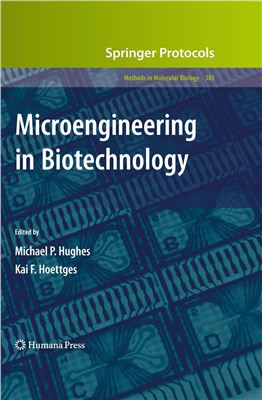Humana Press, Springer Science and Business Media, 2010, 252
pages
Microelectronic engineering has revolutionized electronics, providing new, faster and cheaper ways of doing things – and now the same technology is being applied to biotechnology and molecular biology. As sample volume is reduced, reaction speed and detector sensitivity are increased whilst sample and reagent requirements and device cost are reduced. Microelectronic engineering provides the potential for bench-top versions of large and expensive equipment such as flow cytometry, or novel ones that exploit physical phenomena on the micron scale, such as dielectrophoresis for cell analysis.
Microfabrication Techniques for Biologists: A Primer on Building Micromachines
The Application of Microfluidics in Biology
Rapid Prototyping of Microstructures by Soft Lithography for Biotechnology
Chemical Synthesis in Microreactors
The Electroosmotic Flow (EOF)
Microengineered Neural Probes for In Vivo Recording
Impedance Spectroscopy and Optical Analysis of Single Biological Cells and Organisms in Microsystems
Dielectrophoresis as a Cell Characterisation Tool
AC-Electrokinetic Applications in a Biological Setting
Wireless Endoscopy: Technology and Design
Microelectronic engineering has revolutionized electronics, providing new, faster and cheaper ways of doing things – and now the same technology is being applied to biotechnology and molecular biology. As sample volume is reduced, reaction speed and detector sensitivity are increased whilst sample and reagent requirements and device cost are reduced. Microelectronic engineering provides the potential for bench-top versions of large and expensive equipment such as flow cytometry, or novel ones that exploit physical phenomena on the micron scale, such as dielectrophoresis for cell analysis.
Microfabrication Techniques for Biologists: A Primer on Building Micromachines
The Application of Microfluidics in Biology
Rapid Prototyping of Microstructures by Soft Lithography for Biotechnology
Chemical Synthesis in Microreactors
The Electroosmotic Flow (EOF)
Microengineered Neural Probes for In Vivo Recording
Impedance Spectroscopy and Optical Analysis of Single Biological Cells and Organisms in Microsystems
Dielectrophoresis as a Cell Characterisation Tool
AC-Electrokinetic Applications in a Biological Setting
Wireless Endoscopy: Technology and Design

